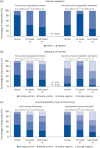Challenges of diet planning for children using artificial intelligence
- PMID: 36467765
- PMCID: PMC9702545
- DOI: 10.4162/nrp.2022.16.6.801
Challenges of diet planning for children using artificial intelligence
Abstract
Background/objectives: Diet planning in childcare centers is difficult because of the required knowledge of nutrition and development as well as the high design complexity associated with large numbers of food items. Artificial intelligence (AI) is expected to provide diet-planning solutions via automatic and effective application of professional knowledge, addressing the complexity of optimal diet design. This study presents the results of the evaluation of the utility of AI-generated diets for children and provides related implications.
Materials/methods: We developed 2 AI solutions for children aged 3-5 yrs using a generative adversarial network (GAN) model and a reinforcement learning (RL) framework. After training these solutions to produce daily diet plans, experts evaluated the human- and AI-generated diets in 2 steps.
Results: In the evaluation of adequacy of nutrition, where experts were provided only with nutrient information and no food names, the proportion of strong positive responses to RL-generated diets was higher than that of the human- and GAN-generated diets (P < 0.001). In contrast, in terms of diet composition, the experts' responses to human-designed diets were more positive when experts were provided with food name information (i.e., composition information).
Conclusions: To the best of our knowledge, this is the first study to demonstrate the development and evaluation of AI to support dietary planning for children. This study demonstrates the possibility of developing AI-assisted diet planning methods for children and highlights the importance of composition compliance in diet planning. Further integrative cooperation in the fields of nutrition, engineering, and medicine is needed to improve the suitability of our proposed AI solutions and benefit children's well-being by providing high-quality diet planning in terms of both compositional and nutritional criteria.
Keywords: Children; artificial intelligence; diet planning; dieticians.
©2022 The Korean Nutrition Society and the Korean Society of Community Nutrition.
Conflict of interest statement
Conflict of Interest: The authors declare no potential conflicts of interests.
Figures



Similar articles
-
Qualitative evaluation of artificial intelligence-generated weight management diet plans.Front Nutr. 2024 Mar 21;11:1374834. doi: 10.3389/fnut.2024.1374834. eCollection 2024. Front Nutr. 2024. PMID: 38577160 Free PMC article.
-
An artificial intelligence-driven agent for real-time head-and-neck IMRT plan generation using conditional generative adversarial network (cGAN).Med Phys. 2021 Jun;48(6):2714-2723. doi: 10.1002/mp.14770. Epub 2021 Apr 25. Med Phys. 2021. PMID: 33577108
-
Personalized Flexible Meal Planning for Individuals With Diet-Related Health Concerns: System Design and Feasibility Validation Study.JMIR Form Res. 2023 Aug 3;7:e46434. doi: 10.2196/46434. JMIR Form Res. 2023. PMID: 37535413 Free PMC article.
-
Artificial intelligence: A joint narrative on potential use in pediatric stem and immune cell therapies and regenerative medicine.Transfus Apher Sci. 2018 Jun;57(3):422-424. doi: 10.1016/j.transci.2018.05.004. Epub 2018 May 9. Transfus Apher Sci. 2018. PMID: 29784537 Review.
-
[Simple obesity in children. A study on the role of nutritional factors].Med Wieku Rozwoj. 2006 Jan-Mar;10(1):3-191. Med Wieku Rozwoj. 2006. PMID: 16733288 Review. Polish.
Cited by
-
Diet Quality and Caloric Accuracy in AI-Generated Diet Plans: A Comparative Study Across Chatbots.Nutrients. 2025 Jan 7;17(2):206. doi: 10.3390/nu17020206. Nutrients. 2025. PMID: 39861336 Free PMC article.
-
Navigating the Landscape of Personalized Medicine: The Relevance of ChatGPT, BingChat, and Bard AI in Nephrology Literature Searches.J Pers Med. 2023 Sep 30;13(10):1457. doi: 10.3390/jpm13101457. J Pers Med. 2023. PMID: 37888068 Free PMC article.
References
-
- Larson N, Ward DS, Neelon SB, Story M. What role can child-care settings play in obesity prevention? A review of the evidence and call for research efforts. J Am Diet Assoc. 2011;111:1343–1362. - PubMed
-
- Gubbels JS, Kremers SP, Stafleu A, Dagnelie PC, de Vries NK, Thijs C. Child-care environment and dietary intake of 2- and 3-year-old children. J Hum Nutr Diet. 2010;23:97–101. - PubMed
-
- Yoong SL, Grady A, Wiggers JH, Stacey FG, Rissel C, Flood V, Finch M, Wyse R, Sutherland R, Salajan D, et al. Child-level evaluation of a web-based intervention to improve dietary guideline implementation in childcare centers: a cluster-randomized controlled trial. Am J Clin Nutr. 2020;111:854–863. - PMC - PubMed
-
- Schwarzenberg SJ, Georgieff MK Committee on Nutrition. Advocacy for improving nutrition in the first 1000 days to support childhood development and adult health. Pediatrics. 2018;141:e20173716. - PubMed

